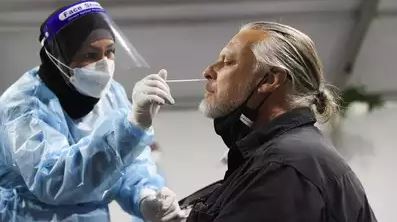Despite the fact that daily coronavirus cases have exceeded 20,000 for the first time in the pandemic, Australia on Thursday limited its definition of close contacts of coronavirus patients and lowered standards for COVID-19 tests in an effort to alleviate demand on testing locations.
Like other countries, Australia is betting that the highly transmissible variant will be significantly less severe than previous variants, despite the fact that most states have relaxed strict restrictions.
In order to prevent asymptomatic people from being forced into isolation, particularly in healthcare, hospitality, and aviation, the rules are being relaxed. This will reduce long lines of people who are required to get PCR tests for interstate travel or because they have been at a public site where a confirmed case has been identified.
In a statement to reporters, Prime Minister Scott Morrison said that with Omicron, “we cannot have hundreds of thousands of Australians and more pulled out of circulation based on laws that were established for the Delta version.”
The term “close contacts” will be modified starting on Friday, according to Morrison, to include persons who reside in the same home as a person who has been infected. They would only be required to have a PCR test if they had COVID-19 symptoms, and they would only have to isolate for seven days.
In the aftermath of a meeting of the national cabinet, Morrison said that if you are anything other than a close contact and you are not symptomatic, you are not required to go and get a test.
According to the new standards, health professionals will depend more on at-home quick antigen testing, while PCR tests will be utilised for those who have COVID-symptoms or who are otherwise susceptible.
The number of people admitted to hospitals is fewer than it was at the height of the Delta wave, despite the fact that record cases are straining testing facilities.
The number of persons in critical care is rather low, with just approximately 120 people (or 0.11 percent) out of more than 110,000 active cases, according to government statistics, which is consistent with the pattern observed in nations with better vaccination levels.
Doctors in Australia, on the other hand, have criticised Morrison’s redefining of close contacts, claiming that it would only serve to speed the spread.
President of the Australian Medical Association, Omar Khorshid, said on Twitter that “(Omicron) doesn’t care whether you’re a family member, a colleague, a drinker at a bar, or a person who shares the same air in a lift.”
“There will be more cases,” says the attorney. Certainly there is no dispute about that. “This is a method of dealing with the enormous number of cases,” he said to reporters.
Although the Omicron wave caused over 363,000 illnesses and 2,225 fatalities, Australia’s total is far lower than that of many similar nations.

